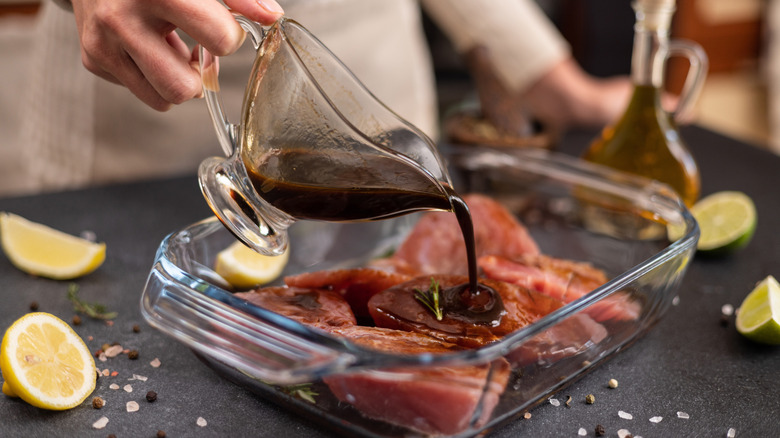Why It's Not Always Better To Marinate Food For Longer
Marinating is such a useful way to flavor and tenderize meat, whether you make your own or buy a bottled version like the lime and ginger pork marinade from Stubb's. A marinade can be a crucial step for grilling perfect tri tip steaks or for creating velveting beef used in stir frying. A great marinade adds layers of flavor and spice to any protein, including fish, chicken, beef, and even tofu. So, if a few hours of marinating is good, then longer times must be even better, right? Not necessarily. It all depends on the meat you're using and other factors, author and certified food scientist Kantha Shelke, Ph.D., exclusively told Chowhound.
"Marinating for extended periods of time can actually be detrimental to the meat," she explains. Shelke is a senior lecturer at Johns Hopkins University and a principal at Corvus Blue LLC, a nutrition research and regulatory affairs firm, so she knows quite a bit about marinating. While it might seem like any meat can be tossed into a bag for as long as you want with any old combination of seasonings, oils, and citrus or vinegar, that is just not the case. "The ideal marinating time depends on the cut of meat, its thickness, and the marinade composition," Shelke says.
Marinating does more than add flavor
The reason marinade times matter is because marinades don't simply add extra flavor. Salt and acids, like lemon juice or vinegar, break down connective tissues and muscle fibers in meat. It's useful with tougher steak cuts and stew meats, but it works for any protein. The problem comes when steeping meat for too long.
"Marinating for too long can result in the meat becoming mushy and way past tender by the continued breaking down of the muscle fibers," food scientist Kantha Shelke says. It's particularly noticeable with more delicate proteins. A timing mistake can ruin your chicken breast and even leave salmon mushy. Chicken can marinate for as little as half an hour, but a few hours is ideal. The U.S. Department of Agriculture recommends marinating chicken for no more than two days. The agency points out that marinating should take place in the refrigerator, not on the counter. And you should boil any marinade that's been in contact with raw meat if you're planning on basting with it.
When it comes to seafood, you don't really need to marinate for more than half an hour. Sturdier, thicker meats like pork chops and steaks benefit from marinating overnight and can easily go a day or two. In addition, the amount of salt or acid you use affects marinade times. For example, yogurt breaks down meats more slowly than lemon juice. If you're uncertain how long to marinate, Shelke suggests that it's "always a good idea to follow the recipe guidelines."

